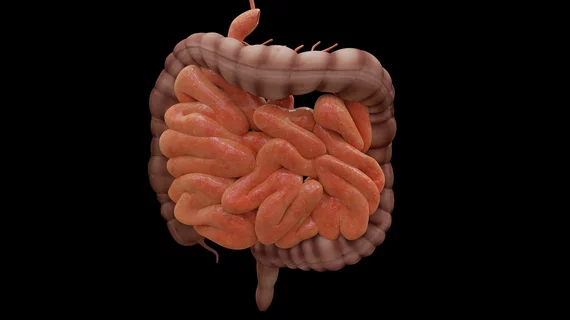Case of COVID-related colitis presents warning for radiologists focused only on respiratory symptoms
Imaging researchers continue to warn the field of the incidental appearance of COVID-19 on abdominal CT scans in patients not suspected of having the disease.
Experts from Qatar highlighted the latest instance of this trend in an example published Monday in Radiology Case Reports. They described a 40-year-old woman with no significant medical history, who experienced nausea that later grew into increasing abdominal pain.
She had no fever, respiratory symptoms, nor sick contacts or recent travel. Clinicians suspected appendicitis, but imaging of the abdomen and pelvis did not back that claim. However, they did note the appearance of colitis, along with incidental changes at the base of the lungs suggestive of the virus, which was later confirmed.
Author Mohammed Khader and colleagues said the case underlines the importance of watching out for gastrointestinal symptoms of COVID-19, which can include loss of appetite, vomiting and diarrhea.
“If physicians focus only on respiratory symptoms to identify suspected cases of SARS-CoV-2 infection in the middle of the global pandemic of the virus, many cases with extrapulmonary manifestations may not be diagnosed on time,” Khader, with the Department of Diagnostic Radiology at Hamad Medical Corporation in Doha, Qatar, and colleagues wrote Sept. 21. “This will have drastic consequences as there will be delay in the diagnosis and treatment for SARS-CoV-2 infection, and the proper protective measures will not be undertaken early, imposing great risk of widespread of the infection to the medical personnel and other patients.”
In the case of the 40-year-old woman, CT of the stomach and pelvis showed mucosal enhancement and mural thickening of the ascending colon and caecum, among other concerns. And the base of the lungs showed bilateral ground-glass opacities and other typical imaging features “highly suggestive” of the novel coronavirus.
She was admitted for further evaluation for the possibility of colitis and spleen enlargement. The patient improved gradually with IV fluid and anti-vomiting medications, with symptoms resolving by Day 4. Virus testing results finally arrived on Day 5, confirming the presence of COVID-19 and she was placed in isolation.
Khader and colleagues noted that cases of COVID colitis have rarely been published, and clinicians should be on the lookout for this concern.
“SARS-CoV-2-related colitis is not well-reported in the literature,” they noted. “We strongly believe that the findings of colitis and lower lung changes are due to SARS-CoV-2 infection, given the fact that these changes were completely resolved in the follow-up CT scan after 2 weeks without any specific treatment other than the supportive treatment of SARS-CoV-2 infection,” they added later.
You can read the full case report here, and another analysis related to the GI symptoms of the disease here.

